- Home
- Neal Asher
The Voyage of the Sable Keech s-2 Page 6
The Voyage of the Sable Keech s-2 Read online
Page 6
‘Of course, relocating the enterprise away from what passes as civilization here, though initially costly, does provide other advantages,’ Bloc added.
Aesop knew what that meant. ‘But to both sides,’ he suggested.
‘I have one advantage of which Lineworld Developments could not conceive.’
Aesop made no reply to that. Despite all his years of experience Bloc had still yet to learn that you could not coerce people into adulation, that it was not something you gained through intimidation and murder. Aesop knew that, for he had made a profession of such.
Crewmen, big heavy individuals with skin distinctively leech-scarred and bluish, threw ropes to others of similar stripe down on the jetty. Aesop watched with interest as the second group began hauling on the ropes. He had heard about this sort of thing but thought the stories exaggerated. However, as the ferry moved sideways up against the pearwood platform, he had to make some rapid reassessments. Perhaps Bloc’s hiring of so many Hooper crewmen had not been such a good idea.
As the three of them disembarked, Aesop noted that other ferry passengers were keeping their distance. Bloc was beginning to reek, but no doubt wanted to get this meeting out of the way before he again used his cleansing unit. Or perhaps he was just getting careless. Aesop had noticed Bloc behaving rather oddly lately—perhaps it was the pressure. As he stepped onto the jetty, he turned and saw one of the Hoopers kick something squealing into the water. The woman grinned at him.
‘Don’t worry,’ she said. ‘We only get one or two up on the jetty.’
Aesop made no response but to follow Bloc on into the enclosed walkway. There he saw numerous stalked eyes, sticking up from the gathering of shells on the beach, turning to track the progress of the passengers. He controlled himself when a couple of those shells launched into the air and crashed against the mesh before falling back down onto the beach again. A screech from a man nearby told him that others had not been quite so prepared for this.
‘Have either of you had any odd messages from your internal diagnostics yet?’ Bloc asked.
‘I’ve yet to be bitten by a leech,’ Aesop replied.
Bones made no sound—his reply by other means.
‘Viral infection can be caused by other media,’ Bloc stated.
That required no response, so Aesop gave none.
It was the general opinion of those who had investigated the matter that Keech’s success with the nanofactory changer had been due in part to his being infected by the Spatterjay virus. There were other elements totake into account though, like him being shot, his use of Intertox inhibitors, and the delay before he got himself into a jury-rigged tank containing sterilized seawater. It was all very risky, and not something Aesop would have countenanced had he the choice. He kept himself well dosed with inhibitors to prevent viral infection, and just hoped. Too little was known about the damned virus. Bloc probably looked forward to his first ‘outside parameter function’ message from his internal hardware, which would tell him he was infected.
They mounted an enclosed stairway spiralling up the side of the Flint and began to climb. Other passengers were soon wheezing after only a few nights. Aesop, Bones and Bloc, clumping along behind the main crowd, did not wheeze, of course, did not breathe at all.
At the first platform, most of the ferry passengers left the stairwell to enter some kind of market. Aesop gazed out at the various stalls, many of them stacked with souvenirs: reproduction thrall units, slave collars, figurines of the Eight, variously sized models of the Skinner and other examples of the planet’s weird life forms, whelk shells, heirodont mandibles or their bones made into Hooper scrimshaw. Other stalls carried the usual cheaply produced items found in markets all across the Polity: ceramal cutlery, chainglass knives that would keep their edge for decades, image intensifiers, enviro boots and suits, augs… The list just went on and on. A couple of stalls carried terrariums and aquariums, and those who spent their money there would afterwards require medical attention. Here, in this market, you could buy everything from scratch-resistant sunglasses to the leech bite that would impart immortality, even if that could be obtained for nothing anywhere else on Spatterjay. Those tourists who bought it here showed their timidity or stupidity.
By the time they had passed another two platforms, the three were alone on the stair leading up. Eventually they stepped out on the top of the Big Flint where Aesop studied his surroundings. Ten years ago Keech stood up here, but things had certainly changed since then.
Some sails were huddled in a mass: large pinkish baggy bodies, long necks hooking above them, terminating in crocodilian heads. Other sails were scattered separately about on the top of the Flint or out on the bubble-metal platform ringing it. Some operated cowled machines Aesop could not identify, until stepping close to one with its weather shield open to find the sail working, with its big spider hands, a touch console and screen inside. Satellite dishes were positioned further out on the platform; cables snaked across the stone. None of the sails paid the three much attention.
‘We are here to see Windcheater,’ Bloc announced.
Abruptly a number of heads swung towards them. Then the crowd of sails parted and a larger, more aggressive-looking creature mooched over towards them. This was definitely Windcheater—Aesop recognized him from the files he had been instructed to study.
‘Yes,’ said the sail.
‘You’re Windcheater?’
The sail did not reply.
‘Are you Windcheater?’ Bloc tried again.
‘Evidently.’
Bloc said, ‘You’ve relocated us. We had an agreement.’
‘Yes.’
‘This is unacceptable. You can’t go back on your word.’
The sail arched its neck to bring its head down level with Bloc. ‘You paid me so you could come here and build a ship to sail your pilgrims to the Little Flint. The plans you submitted were for you to launch it from the Chel Island, but I did not agree to them. I don’t want you people that close to me. Now bugger off.’ The sail began to turn away.
‘What about the sails for our ship?’ Bloc quickly asked. ‘You agreed to that. It’s part of your law that no ship can sail without at least one of your kind aboard.’
‘You’ll get your sails,’ Windcheater told him.
‘There’s an economic reason for you moving us, isn’t there?’ Bloc suggested.
Aesop was impressed: Taylor Bloc was not normally so restrained.
Showing more interest than heretofore, the sail swung back. ‘For example?’
‘Because no more are being produced, there’s only a limited number of reifications who can come here for either a cure or their physical destruction by the virus, so eventually pilgrimages by those you find distasteful will dwindle. So afterwards you’ll get yourself a piece of civilization established on another island.’
‘Smart dead man,’ said the sail.
Aesop felt like laughing, but had lost that ability long ago. Nothing about the additional costs and a probable takeover by Lineworld. Windcheater had clearly been paid to relocate them. However, Bloc was only going through the motions. He had obviously decided on his course now.
* * * *
The sail Huff had been informed by humans, AIs and Windcheater that he remembered his name because he was brighter than the average sail, for a certain horrible reason. When the Batian mercenary Shib had stapled Huff’s neck to the mast of Captain Drum’s ship, the Ahab, and when Jay Hoop’s lunatic wife Rebecca Frisk had subsequently cooked Huff’s skull with a laser, his brain had then regrown without the usual hard wiring. Puff, it was supposed, remembered her name for similar reasons, telling Huff she only vaguely recollected the heirodont that had clamped its jaws on her skull when she had peered over the edge of the Little Flint to see about snapping up one of the hammer whelks nestling down there. Huff speculated that a similar happenstance had resulted in Windcheater’s enhanced intelligence, perhaps when the planet had been ruled by the Eight, who had
taken as much pleasure in hunting indigenes as those humans who escaped from the coring facility. Windcheater was not telling. However, no such drastic damage had resulted in the cerebral rewiring of the third sail, nor was likely to. Huff now eyed their companion.
Zephyr was as big as Windcheater, and no heirodont’s jaws carried the muscle to crush his ceramal skull, and no one would be stapling him to a mast. His tough carbon polymer skin was the hue of blued steel. His teeth were chainglass and his bones were composite-reinforced bubble-metal. In his chest he carried two state-of-the-art fusion reactors, which drove his carbon-fibre muscles and powered his crystal brain and formidable sense array. His eyes were gleaming emeralds. Zephyr had very little to fear, being a Golem sail.
Huff and Puff’s partnership had lasted for ten years, from when they discovered much in common with each other and little with their fellows. Zephyr, when he arrived here less than a year ago, had been much less coherent than he was now. Windcheater had treated him with suspicion; the response of other sails had been confusion. Huff and Puff, however, adopted him as an outcast like themselves. They showed him their world, talked and flew with him. In a short time they became fascinated by the Golem sail’s strange combination of hard-headed wisdom and not quite sane pronouncements on life and death. They argued and flew, learnt, and thus became even more distant from their fellows. When he volunteered the three of them for a task other sails wanted no part of, he became the leader and they the followers.
‘I think I see it now,’ said Huff.
‘You do,’ Zephyr replied. ‘And now we need to go faster.’ The Golem sail accelerated.
Huff and Puff looked at each other questioningly, then grabbed air to catch up with their companion.
‘What’s the hurry?’ Puff complained. ‘The money’s the same either way and there’s no way they’ll be sailing without us.’
Zephyr glanced aside. ‘I will see the soulless sail.’
‘And…?’ said Huff.
Zephyr’s voice changed to more normal tones, as if the Golem sail now assumed a prosaic guise. ‘Beyond the reason that will soon become evident to you, we have reason to get this part over with as quickly as possible.’ Zephyr held up the harness he clasped in one claw. ‘We might not be within the Polity, but this Warden will take a dim view of what we’re about if he catches us. From what I’ve been told he doesn’t put much credence in the rules and regulations supposedly governing his status.’
‘What might he do?’ Puff asked.
Huff had a damned good idea; he had been in the middle of the events that resulted in the new Warden. He still remembered the taste of the human heads he had bitten off just before the Ahab sank and the device inside it detonated. And later he had been high in the sky watching when the war drone Sniper, who was now the Warden, had come down like a hammer on that Prador ship.
‘It is this way,’ said Zephyr. ‘The new Warden would try not to endanger any innocent Polity citizen, but it might be possible to identify us by a chemical analysis of the ash floating on the sea. I do not choose Death. I refuse it.’
‘But you are a Polity citizen,’ Huff pointed out.
Zephyr exposed his chainglass teeth so they glinted in the sunset light. ‘But not innocent; and that I’m not an ignorant native makes me doubly culpable.’
‘No forgiveness then,’ asked Puff.
‘Outmoded concept of human law. We are all responsible for our actions.’ Zephyr pointed ahead with one long metallic talon. ‘Do you see now?’
Huff and Puff peered ahead.
‘Oh, one of them,’ said Huff.
3
Putrephallus Weed:
phallic in shape and stinking like rotten corpses, this is not a plant xenobotanists much enjoy studying. They grow from a large seed, throwing up in only a few days a two-metre-tall green phallic stalk, and spreading catch leaves low to the ground. The tips turn red as they ripen, attracting the lung birds to eat them, gain some nutrition from the outer fruiting body, then vomit up the inner pollen sack. This usually happens in another stand of the same plants, perhaps caused by some kind of pheromonal trigger. The pollen sacks splash on the ground, spraying liquid pollen over the catch leaves and entering their central stigma. The seeds then developing are raised up in the tips of yet more phallic growth, are eaten by the lung birds, then vomited up at other locations. Lung birds, perhaps gratefully so, are also the main pollinators of the sea lily -
His room already booked and hotel code key to hand, Bloc strode into the hotel ignoring the dubious looks cast in his direction. His suitcase, walking on four spidery legs, had to scuttle to keep up with him. Usually he used a hover trunk to transport his belongings, but had purchased this semi-AI luggage thinking Windcheater’s proscription covered all forms of anti-gravity. It annoyed him to now discover the ruling applied only to privately owned transportation for people and cargoes that could be moved by sailing ship but, even then, reasonable requests might be granted. Windcheater simply did not want the skies crowded with AG scooters and cars, and did not want the sail and Hooper monopoly of sea transportation undermined.
Taylor Bloc entered the elevator, a couple stepping in behind him, then quickly stepping out again while staring at him accusingly. It was long past time for Bloc to use his cleansing unit and related equipment. He stepped out on the relevant floor, moved quickly to his room, and there ordered his suitcase up on the bed and open, while he shed his coat and envirosuit, followed by an underlying noxmol suit. This particular garment consisted of a porous inner layer, a layer of activated carbon wool through which air was cycled, finally exiting through micron filters at his shoulders, and an outer, impenetrable layer of monofabric. Shedding that he then inspected his absorbent under suit, which was stained and stinking. He stripped it off, balled it, and threw it into the disposal unit. Then walked over to the wardrobe mirror to give himself a visual inspection.
He was a corpse, grey and wrinkled. His death had been hard, and though they had done their best to put him back together during the reification process, their work had been, so to speak, cut out for them. His genitals were gone. They had never been able to find them, though he had later learnt, to his disgust, what had happened to them, and consequently something of one of his killer’s appetites. His broken or severed bones, the reifiers bone-welded and clamped, while installing the joint motors. His organs and muscles had been meticulously returned and connected up with balm pipes. Cell welding, carbon-fibre mesh, collagen foam and even stitching had all been used. Much of his seared skin had been useless, hence his appearance now: muscles visible in their wash of dirty blue balm under translucent syntheskin.
Bloc inspected his front, noting the growth of some sort of mould at the join between synthetic and real skin at his waist. He took a hand mirror out of his suitcase, then turned slowly, observing himself in the now doubled reflection from the wardrobe mirror. Ah, there was the main reason for the multitude of error messages flashing up in his visual cortex: underneath syntheskin covering his lower back, a wriggling colony of small green maggots. They had to be some tough alien strain, since the insecticides in the balm washing round inside him was proof against all Terran infestations. But he had dealt with such problems before and knew the routine. First, though, his exterior.
From his case Bloc removed a flat square bottle of a green jelly and a long-handled soft brush, and took them with him to the bathroom. Here he found, as requested, the shower had the facility to mix additives. He uncapped the bottle, pressed it into the receiver, and turned on the shower. The water turned green with the addition of a powerful concentrate of antivirabact and insecticides. The water that ran down the drain was not such a pleasant colour, though. Now using the brush he worked over his entire body, cleaned away the mould and eyed some of the green maggots wriggling down the waste. After his shower he used the air dryer, as employing a towel might have rubbed away more than just moisture.
Returning to his bedroom, Bloc took a handful of elasticize
r cream from a tub in his case, and rubbed it into all his grey skin. Sitting on a towel on the bed, he then took out his cleansing unit. This device was encased in brushed aluminium, circular, twenty centimetres across and ten deep. It was a more modern version of the device Sable Keech had once used in this very hotel, but then Keech’s reification did predate his own by about five hundred years. The two tubes he uncoiled from a hatch in the side, he plugged straight into sockets below his armpit. The device started cycling immediately, pumping out filthy grey-blue balm, filtering it and adjusting its chemical composition back to optimum and pumping it back in like liquid sapphire. He would empty the device’s sump sometime later. Now for the maggots.
Bloc pulled out a flat square box of the same brushed aluminium as his cleanser, opened it, and scooped out a handful of small silvery objects. To the naked eye they looked nothing much, but magnification revealed them as small metal beetles, scarabs, with their legs folded close. He placed them against his skin below the maggot infestation, waited a moment, then took his hand away. They were all gone; burrowing through the joint to hunt down their prey.
While he waited for the various processes to complete, Bloc pulled his noxmol suit closer with his foot, stooped and picked it up. He opened the top pocket and removed from it a lozenge of golden metal with attached neck chain. This was what it was all about.
The nanofactory changer was the creation of a brilliant scientist, resulting from her research into an alien technology that had caused some problems for the Polity a few centuries back. It was packed with Von Neumann nano- and micromachines, and as such was capable of reproducing itself. All that was needed was another case built to specifications stored in its memory—a case packed with the base elements required to build its complex guts. The two cases were then connected, submerged in a zero-G tank of water containing metal salts, nanoscopic gold particles and free droplets of liquid mercury, which then had a huge electric charge put across it. Bloc had seen this done. When the process completed, the two now identical nanofactories rested in a Gordian tangle of strange nanocircuitry which rapidly began to fall apart. The whole process defied analysis even by AI, for, following twisted Heisenbergian principles, it broke down if any kind of scan was used to study it. The nanofactories themselves were the same: a scan of the case resulted in processes activating inside it, which in turn resulted in the case ending up full of either metallic sludge or dangerous nanomachines that not even the dead would want in their bodies.

 The Bosch: A Novella (Polity Universe)
The Bosch: A Novella (Polity Universe)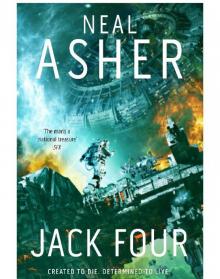 Jack Four
Jack Four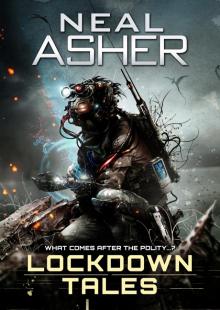 Lockdown Tales
Lockdown Tales The Warship
The Warship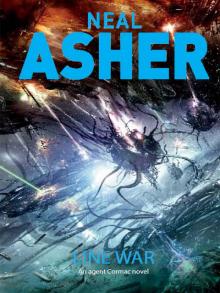 Line War
Line War Total Conflict
Total Conflict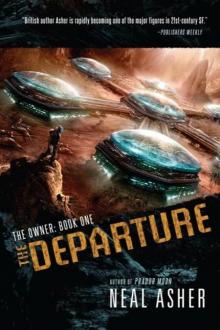 The Departure
The Departure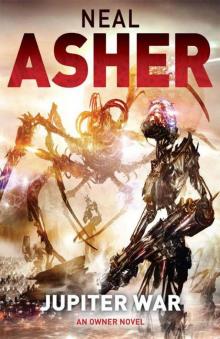 Owner 03 - Jupiter War
Owner 03 - Jupiter War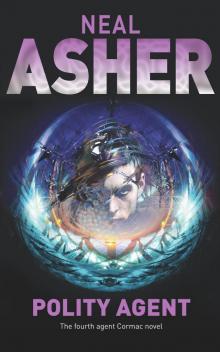 Polity Agent
Polity Agent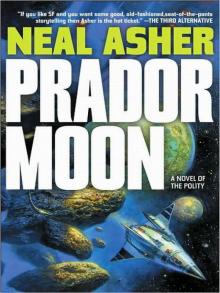 Prador Moon
Prador Moon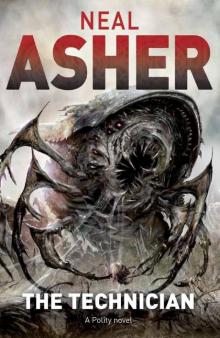 The Technician
The Technician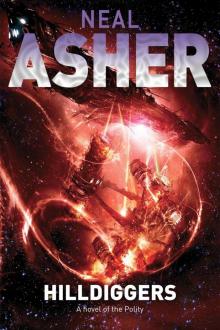 Hilldiggers
Hilldiggers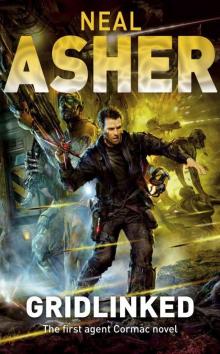 Gridlinked
Gridlinked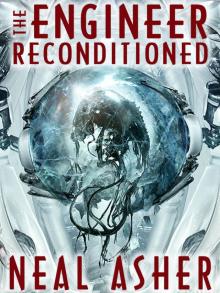 The Engineer ReConditioned
The Engineer ReConditioned Dark Intelligence
Dark Intelligence The Soldier: Rise of the Jain, Book One
The Soldier: Rise of the Jain, Book One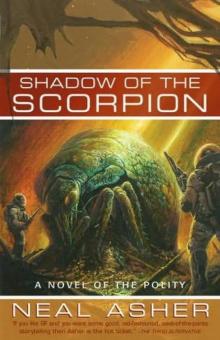 Shadow of the Scorpion p-2
Shadow of the Scorpion p-2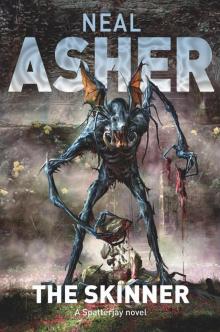 The Skinner
The Skinner The Soldier
The Soldier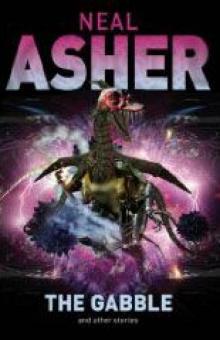 The Gabble p-13
The Gabble p-13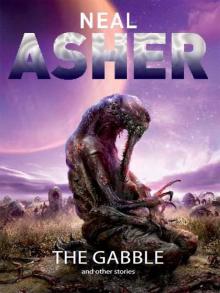 The Gabble and Other Stories
The Gabble and Other Stories The Parasite
The Parasite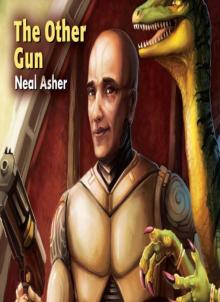 The Other Gun
The Other Gun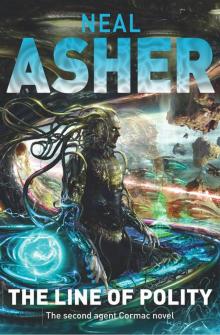 The Line of Polity
The Line of Polity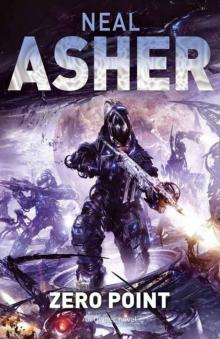 Zero Point (Owner Trilogy 2)
Zero Point (Owner Trilogy 2)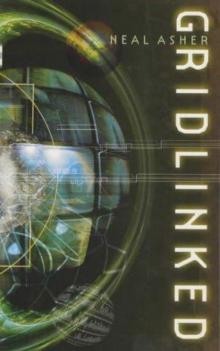 Gridlinked ac-1
Gridlinked ac-1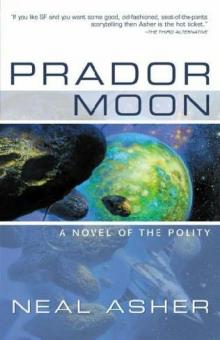 Prador Moon p-1
Prador Moon p-1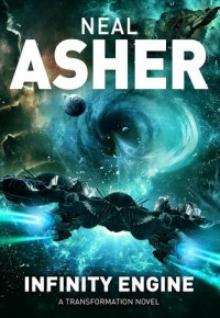 Infinity Engine
Infinity Engine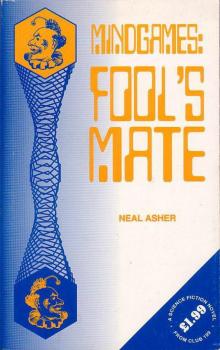 Mindgames: Fool's Mate
Mindgames: Fool's Mate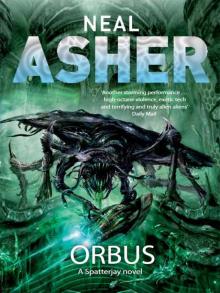 Orbus
Orbus Africa Zero
Africa Zero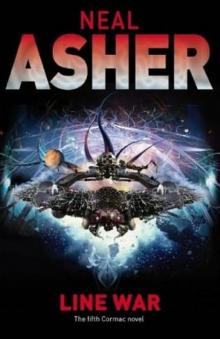 Line War ac-5
Line War ac-5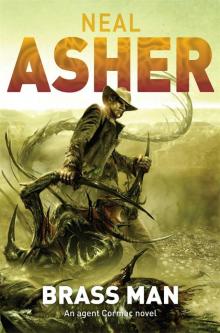 Brass Man
Brass Man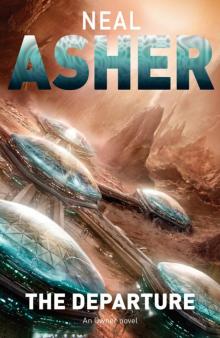 The Departure to-1
The Departure to-1 Cowl
Cowl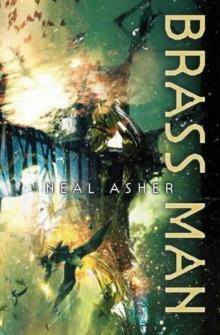 Brass Man ac-3
Brass Man ac-3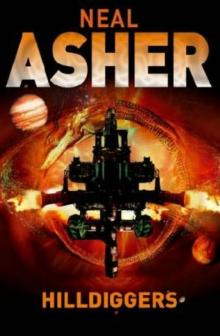 Hilldiggers (polity)
Hilldiggers (polity)![Greg Bear - [Eon Trilogy 1] - Eon (rescan) (v1.0) Read online](http://i1.bookreadfree.com/i2/04/08/greg_bear_-_eon_trilogy_1_-_eon_rescan_v1_0_preview.jpg) Greg Bear - [Eon Trilogy 1] - Eon (rescan) (v1.0)
Greg Bear - [Eon Trilogy 1] - Eon (rescan) (v1.0)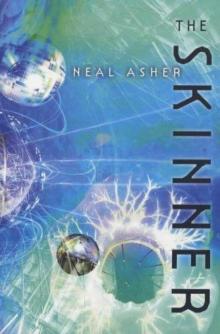 The Skinner s-1
The Skinner s-1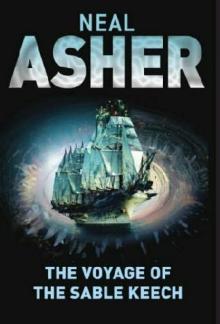 The Voyage of the Sable Keech s-2
The Voyage of the Sable Keech s-2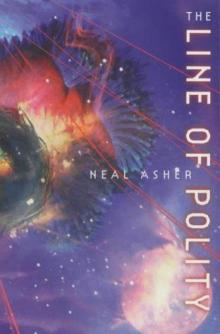 The Line of Polity ac-2
The Line of Polity ac-2 War Factory: Transformations Book Two
War Factory: Transformations Book Two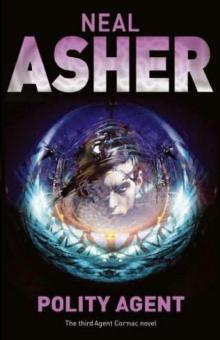 Polity Agent ac-4
Polity Agent ac-4